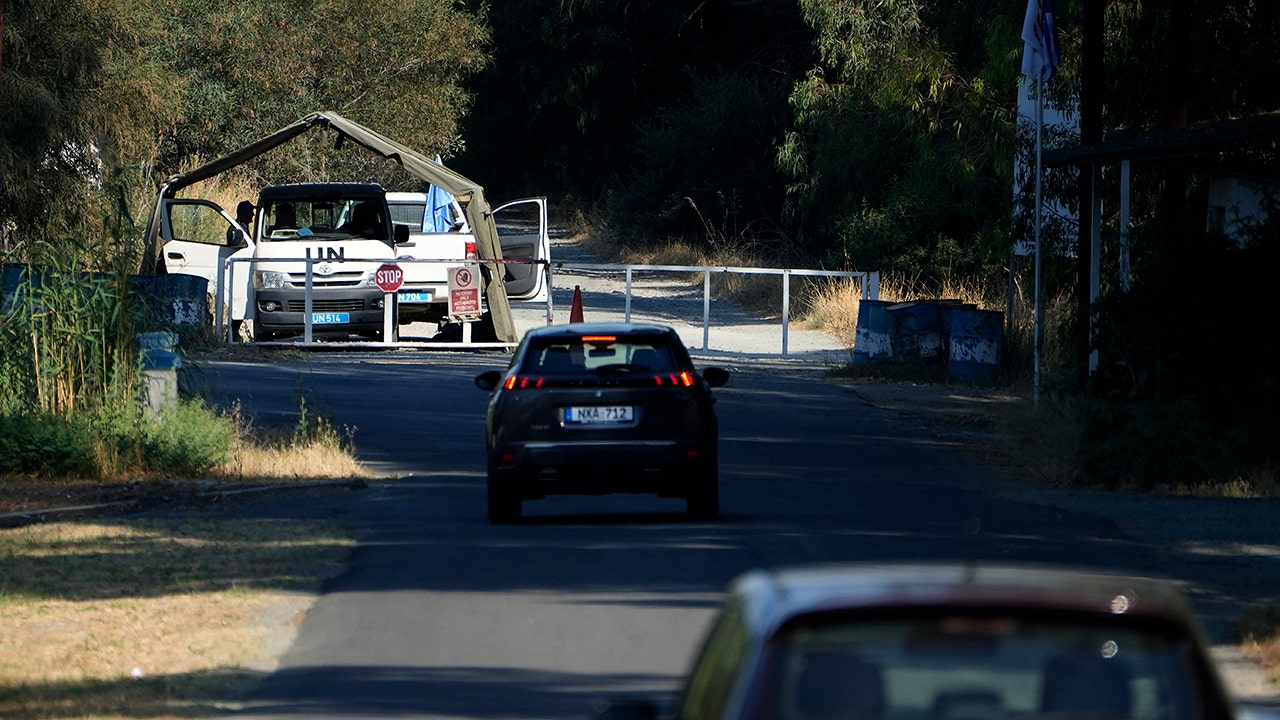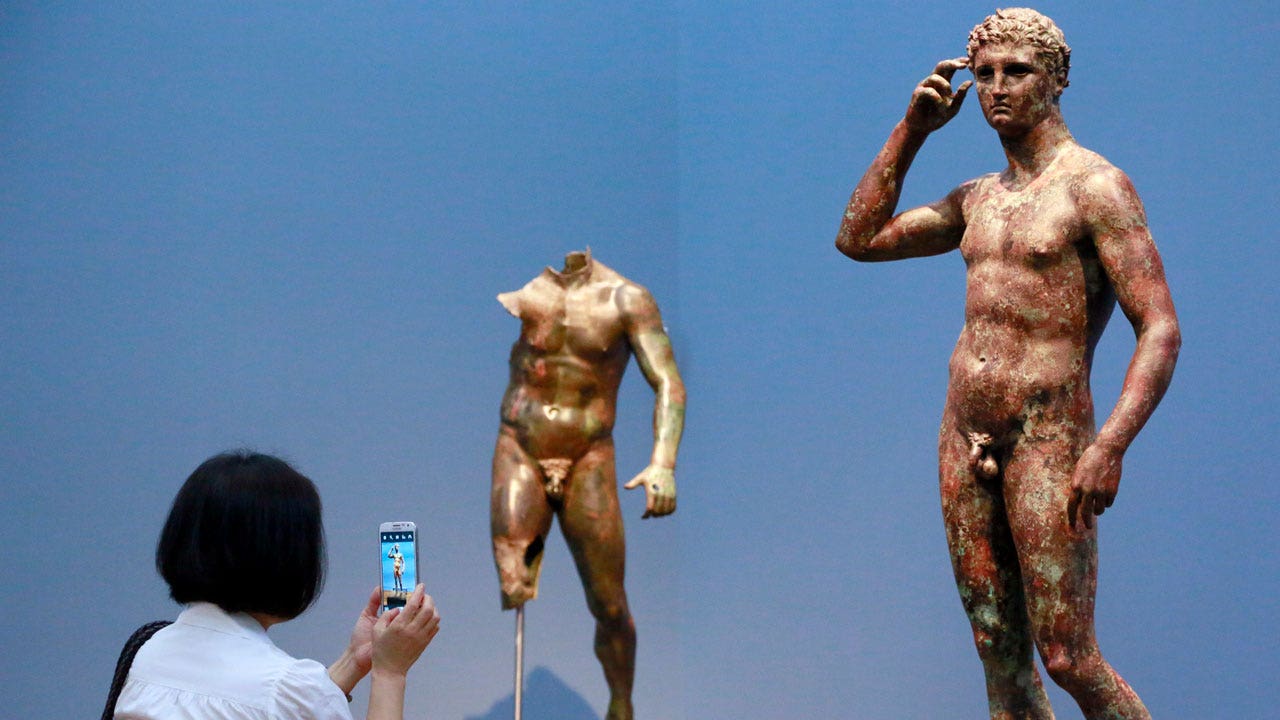The Czech Republic has frozen the assets of two men and a news website it accuses of running an influence operation in Europe supporting “the foreign policy interests of the Russian Federation,” the country’s Foreign Ministry said in a statement.
The ministry identified the men as Viktor Medvedchuk, a high-profile, pro-Russian Ukrainian politician and the leader of the effort, and Artem Marchevskyi, a Ukrainian-Israeli citizen who allegedly ran the website, the Czech-registered Voice of Europe. Long known as an ally of the Russian president, Vladimir V. Putin, Mr. Medvedchuk was arrested in Ukraine and handed over to Russia in a prisoner exchange in 2022.
“We cracked down on a Russian influence operation that was directed by Viktor Medvedchuk directly from Russia,” Jan Lipavsky, the Czech foreign minister said in a statement. “The aim was to spread pro-Russian narratives undermining Ukraine’s sovereignty while infiltrating the European Parliament.”
While the Czech authorities refused immediate comment on how expansive the effort was or how richly financed, officials promised further revelations.
“Actions in other countries will follow,” the Czech prime minister, Petr Fiala, said on social media, adding that the recent actions were “the result of international cooperation”
Citing unnamed intelligence sources, the Czech news media reported that politicians from Germany, France, Poland, Belgium, the Netherlands and Hungary had been paid by the Voice of Europe to promote Russian interests in the European Parliament.
The Belgian prime minister, Alexander De Croo, lent substance to those reports, saying in the Belgian Parliament on Thursday that “close collaboration” between the Belgian and Czech intelligence services had found that “Russia has approached” and “paid” lawmakers in the European Parliament to “promote Russian propaganda.”
According to Der Spiegel, the prominent German news outlet, one of the politicians who received financial compensation was Petr Bystron, a German lawmaker from the far right Alternative for Germany party.
The revelations come as the European Union is bracing for more foreign interference ahead of European Parliament elections less than three months from now. Since Russia’s invasion of Ukraine, the bloc has been a firm supporter of Kyiv, sending aid worth billions of dollars to help the country sustain itself and fend off Russian attacks, making the Parliament a ripe target for the Kremlin, analysts say.
“This is not very surprising and confirms what we have suspected: The Kremlin is using dodgy outlets pretending to be media, it is using money to buy covert influence in an attempt to swing public opinion in the E.U. and meddle in elections,” said Vera Jourova, the bloc’s commissioner for values. Ms. Jourova, a Czech citizen, has been calling for the bloc to take a more active stance against Russia’s interference. “We can’t afford to be one step behind Putin and his propaganda army on the chess board.”
Neither Mr. Medvedchuk nor Mr. Marchevskyi could immediately be reached for comment. Voice of Europe, whose website appeared to be down, did not respond to a message sent through X.
The European Parliament is one of the three key institutions of the European Union, although it is widely considered the least powerful. Its 705 members, elected in their home countries and serving five-year terms, do not initiate legislation, but their approval is usually required to pass it. They can also censure the European Commission, the European Union’s executive arm, and play an often high-profile role in scrutinizing the bloc’s policies.
Despite their limited institutional power, European lawmakers are often approached by lobbyists from nations, industries and interest groups seeking to influence public opinion and to gain allies in important policy debates.
Since the Czech sanctions were announced, the website of Voice of Europe has been taken down. In its last post on the social media site X, on March 27, the outlet described itself as a source of “uncensored network news from Europe and the world.” However, a review of the X account turned up a potpourri of right-wing conspiracy theories, like purported statistics on sexual crimes committed by migrants, the harm done by Covid-19 lockdowns and “globalist censorship” imposed by the European Union.
The Voice of Europe’s YouTube page features interviews with prominent European politicians from far right parties in Belgium, France, Germany, Italy, Poland and the Netherlands.Sample headlines have included: “China — not Russia — is the primary threat to the West;” “Germany is constantly pressured into escalating the war in Ukraine;” “Peace negotiations should also respect Russian interests;” and “Nations states should be monocultural.”
In a related case, Polish security officials said in a statement on Thursday that they had raided several locations and seized about $88,000 in cash, as well as hard drives and phones, as part of an investigation into “espionage activities for the Russian Federation directed against states and bodies of the European Union.”
The raids were an outgrowth of an earlier investigation into a Polish citizen accused of spying for Russia who has been active in the European Parliament, the Polish authorities said.
The man, identified by Polish officials as Janusz Niedzwiecki, was accused earlier this year of “performing tasks commissioned and financed by Russian intelligence collaborators. Those included, according to the Internal Security Agency, “propaganda, disinformation activities and political provocations,” with the goal of “building Russian spheres of influence in Europe.”
Mr. Niedzwiecki operated from 2016 until his arrest in 2021 in Poland and other E.U. countries, as well as in Azerbaijan, Ukraine and Moldova, the intelligence services said in a statement issued after the earlier investigation.
According to internal records reviewed by The New York Times, Mr. Niedzwiecki secured a badge giving him access to the European Parliament through Maximilian Krah, a German far right lawmaker in the European Parliament who has been featured on the Voice of Europe’s YouTube page. Under the Parliament’s rules, lawmakers can request up to four such badges for people like family members, drivers, experts, advisers and private tutors.
Mr. Niedzwiecki made good use of the privilege: Internal parliamentary records show that he visited the Parliament at least 50 times on the badge from Mr. Krah until his arrest in May 2021.
Asked about Mr. Krah’s connections to Mr. Niedzwiecki, Mr. Krah’s office said, “There was no indication in 2019 that the aforementioned person might be connected to any such activities. The badge was issued to Mr. Niedzwiecki upon recommendation from friends within the party.”
Mr. Krah has a history of making pro-Russian statements and voting against parliamentary resolutions condemning Russia. He was among lawmakers who declined to declare Russia a “state sponsor of terrorism” over the war in Ukraine in November 2022.
Following the Russian full-scale invasion of Ukraine, Mr. Krah wrote on social media, “The sleepwalkers in Berlin and Brussels are leading us into a foreign war — without rhyme, reason or purpose!”
At a parliamentary debate on the situation at the Russian-Ukrainian border in December 2021, Mr. Krah said, “Whoever accepts Ukraine into NATO is provoking, whether we like it or not — I don’t like it either — the Russian attack. And now ask yourself whether you are prepared to accept war for Ukraine’s NATO membership.”
Last year, Mr. Krah sparked outrage in Berlin over German news media reports that he had received payments from China through one of his parliamentary assistants. The 47-year-old politician has sent messages praising the founding of the Communist People’s Republic of China and has also been openly critical of reports on the internment and exploitation of Uighurs, which he has called “anti-China” propaganda.
In Germany, Mr. Krah is seen as a close ally of one of the most extreme AfD leaders, Björn Höcke, who is under surveillance by domestic intelligence services and is facing trial next month for using Nazi slogans.
A spokesman for the president of the European Parliament, Roberta Metsola, said that Ms. Metsola was “aware of the allegations being made” and “looking into specific allegations.”
While the extent of the apparent Russian influence operation remains unknown, its exposure represents an important “blow against the Russian propaganda apparatus,” Nancy Faeser, Germany’s interior minister, told Der Spiegel. The network, she said “exerts illegitimate influence on the European Parliament on behalf of Russia” and “uses politicians from several European countries and provides considerable financial resources.”
She added that the revelations show “the massive extent of the lies and disinformation” that the Kremlin employs to “shake trust in our democracy, stir up anger and manipulate public opinion.”
Erika Solomon contributed reporting from Berlin.






